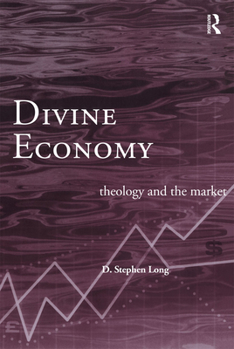Divine Economy: Theology and the Market
Select Format
Select Condition 
Book Overview
What has theology to do with economics? They are both sciences of human action, but have traditionally been treated as very separate disciplines. Divine Economy is the first book to address the need for an active dialogue between the two.
D. Stephen Long traces three strategies which have been used to bring theology to bear on economic questions: the dominant twentieth-century tradition, of Weber's fact-value distinction; an emergent tradition based on Marxist social analysis; and a residual tradition that draws on an ancient understanding of a functional economy. He concludes that the latter approach shows the greatest promise because it refuses to subordinate theological knowledge to autonomous social-scientific research.
Divine Economy will be welcomed by those with an interest in how theology can inform economic debate.
D. Stephen Long traces three strategies which have been used to bring theology to bear on economic questions: the dominant twentieth-century tradition, of Weber's fact-value distinction; an emergent tradition based on Marxist social analysis; and a residual tradition that draws on an ancient understanding of a functional economy. He concludes that the latter approach shows the greatest promise because it refuses to subordinate theological knowledge to autonomous social-scientific research.
Divine Economy will be welcomed by those with an interest in how theology can inform economic debate.
Format:Paperback
Language:English
ISBN:0415226732
ISBN13:9780415226738
Release Date:March 2000
Publisher:Routledge
Length:336 Pages
Weight:1.16 lbs.
Dimensions:1.0" x 6.2" x 9.2"
Customer Reviews
1 rating
Like crystal: Dense, Clear, Brilliant
Published by Thriftbooks.com User , 19 years ago
At only 50 pages in, I am already locked on. I'ts always gratifying when I purchase a book due to an interview with the author (in this case, the June/July issue of The Door), and find the writing style consistent with his or her conversational style. In the case of Stephen Long, the author seems to have done the heavy lifting in advance so layman that I am, I can follow the direction and intent of the text without stopping to back up too frequently. Also, the subject of Capitalism's dependence on essentially Theological issues for its survival is an extremely exciting idea to contemplate! I expect to purchase more work on this concept and to look up some of Mr. Long's sources.





